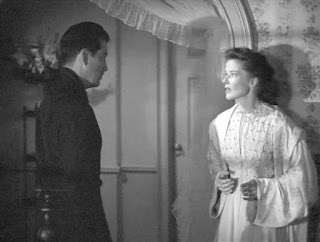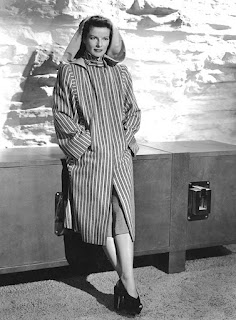Directed by Vincente Minelli; produced by Pandro S Berman
Living contentedly with her father (Edmund Gwenn), Ann Hamilton (Katherine Hepburn) is a young
woman with few dreams, who believes she’s destined to be an old maid. Then she
meets handsome and wealthy engineer Alan Garroway (Robert Taylor), who sweeps
her off her feet and, after a swift courtship, whisks her away to live in
Washington D.C. as his wife. Slowly, however, Ann realises that Alan harbours
an obsessive rivalry with his long-vanished brother, Michael, and eventually
learns that that obsession could destroy the happiness she has suddenly found.
Undercurrent starts off promisingly, and even continues
well enough, but its progress is hampered by several factors, the most obvious
of which is its resemblance to Rebecca
(1940). That the missing brother is not seen - until well into the movie’s
third reel - while he nonetheless has an effect on the major characters is so
much like the Hitchcock film that this one could have been titled Michael. Like another film, The Second Woman (reviewed on this blog
in January of this year), which was even more like Rebecca in its premise, Undercurrent
does go its own way after a while, and in particular has a different
resolution. Nonetheless, the plot is close enough to Rebecca’s to be distracting.
Another problem is the movie’s length - or, rather, the story’s length. At just short of two hours, Undercurrent is not an overly long film, but the story should not have gone on as it did. It does not suffer from unnecessary padding, but there are a couple of times when the viewer feels an ending should have occurred, but didn’t. The story’s events could have been more economically arranged without detriment to the script.
The acting is better than the story or script; it would be hard
for it to be otherwise when the leading lady is Katherine Hepburn. She does a
fine job of portraying a timid woman, one who looks to a man for decisions.
This is a contrast to most of her roles, though she had one somewhat similar in
The Rainmaker (1956), though in that
case, the character’s maturity provided a fragile strength. While different,
Hepburn carries it off, and indeed, it is necessary that she does so for the
story-line. The change that Ann undergoes through the film is not one of
character as much as realisation; she doesn’t really become stronger, but what
she is forced to understand creates a slightly different person.
Taylor also does well, though, since his performance benefits from
showier, more robust emotions, he may have had an easier time of it than
Hepburn. In any case, the two leads work successfully together. Third billing
goes to Robert Mitchum, who, like Hepburn, plays against type, a quiet, subdued
performance that is effective.
The direction was a departure, too, for Vincente Minelli, who was
previously behind the camera for a number of comedies and musicals. He does a
good job creating tension, and if there is still vitality to the film after it
starts running out of story, it is largely due to him.
Undercurrent is a good movie, but not a very good movie. It profits greatly from the three stars, and certainly is helped by the director, but the story is too familiar, and it continues long enough for the viewer to sort out the lies and rumours that fill the screenplay. Good efforts are damaged by a script that wasn’t intriguing or sharp enough for its length. (Jayne Meadows has a substantial part in this, her first movie; look for Barbara Billingsley as a party guest, and that’s Hank Worden delivering the telegram at the beginning.)







I haven't seen the movie, but apparently most people agree with your assessment: a good enough movie, but nothing special. Although it must have been interesting to see Hepburn playing a passive woman. Talk about playing against type.
ReplyDeleteSounds like the film may be aptly named though...I wonder it that is the same Robert Taylor who, in the 90's, played a role on Texas Rangers...as the lawyer father of a female lawyer on the show. Just maybe four appearances.
ReplyDeleteThis movie's Robert Taylor died relatively young (not quite 58) of lung cancer in 1969, so it's not the same fellow.
Delete